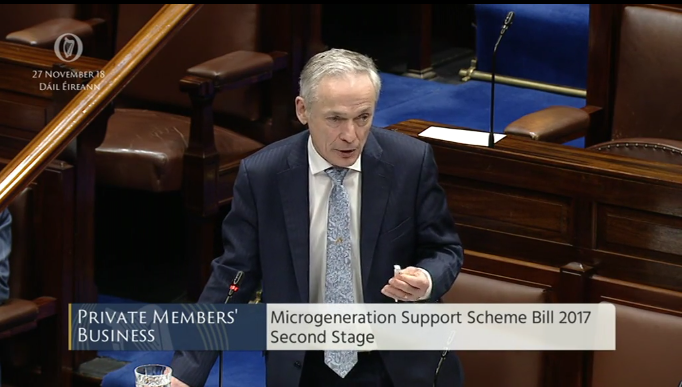ROI homeowners are one small step closer to being able to sell electricity they generate from the likes of solar photovoltaic panels back to the grid, thanks to a private member’s bill put forward by TD Brian Stanley passing the second stage in the Dáil on the 27th November 2018.
Currently it’s very difficult to get connected to the electricity grid to export to it, and there are no mechanisms in place for you to get paid for the electricity you feed into it.
Before the Microgeneration Support Scheme Bill 2017 can be enacted, and turned into law, it must go through three further stages. There is no guarantee the bill will progress into law.
Current Minister for Energy Richard Bruton (pictured above) said that a feed-in-tariff mechanism would require a regulatory impact assessment. This could include evaluating the costs associated to grid connection and administering the scheme.
Commenting on the bill, Minister Bruton said: “I need to ensure that whatever legislation we bring in is the most cost-effective in terms of community engagement, that it is effective in meeting our obligations, and that it is effective in meeting the challenge of climate change.”
“We will have to transpose a more detailed EU [microgeneration] directive into Irish law, so by no means am I seeking to put off, delay or scupper legislation in this area.”
Grants and taxes
Minister Bruton said that installing a microgeneration device such as PV panels can pay for itself in approximately eight years.
He said the existing grant scheme for homeowners to install photovoltaic (PV) panels was proving very successful and that it was expecting to enrol 5,000 applicants a year up to 2020.
Minister Bruton added the grant scheme will be under review early in 2019 to examine the possibility of expanding it to other technologies or to other groups of people.
He added carbon taxes will be another way to help with the government’s commitment to fight climate change. He also spoke about the success of the Sustainable Energy Authority of Ireland’s community schemes.
The bill will now go through to the Committee stage in which each section will be examined and amendments made. The list of topics to conduct further research into include regulatory and infrastructure costs as well as the payment model for a feed-in-tariff.
‘Misgivings’
Minister Bruton’s ‘misgivings’ are in relation to the cost of administering the scheme, as outlined above, and the 5 per cent microgeneration quota.
“As to whether [the 5 per cent obligation] is a realistic or deliverable target, while I am just a month in this job, from what I have learned it does not appear that microgeneration can hit such a target,” commented Minister Bruton.
UPDATE 05 March 2019: The bill is progressing through the parliamentary stages. The SEAI and the Tipperary Energy Agency among others made submissions for the Detailed scrutiny of the Microgeneration Support Scheme Bill 2017 in the Oireachtas
UPDATE 17 June 2019: The Climate Action Plan supports the introduction of a feed-in tariff for all by 2021. More details here.









